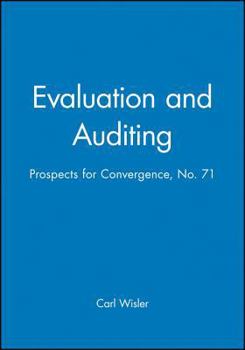Evaluation and Auditing: Prospects for Convergence: New Directions for Evaluation, Number 71
(Book #71 in the New Directions for Evaluation Series)
Both evaluation and auditing claim to help decision makers by providing them with systematic and credible information that can be useful in the creation, management, oversight, change, and occasionally abolishment of programs. Yet despite considerable overlap in objectives, subject matter, and clients, auditing and evaluation have until recently functioned largely in isolation from on another. The literature of each discipline scarcely recognized the existence of the other; academic preparation of auditors and evaluators could hardly be more different. Organizationally, the two activities have traditionally been separate. The practitioners have difficulty communicating with one another not only because of differences in vocabulary but also because of some important differences in mind-set. This issue explores the question of whether auditing and evaluation are on convergent courses or whether the two disciplines will persist as distinctive services to decision makers. The chapters are based on presentations made at the International Evaluation Conference held in Vancouver, British Columbia, in November 1995. This is the 71st issue in the journal series New Directions for Evaluation .
Format:Paperback
Language:English
ISBN:0787998877
ISBN13:9780787998875
Release Date:November 1996
Publisher:Jossey-Bass
Length:71 Pages
Weight:0.33 lbs.
Dimensions:0.3" x 5.8" x 9.0"
Related Subjects
PsychologyCustomer Reviews
0 rating





